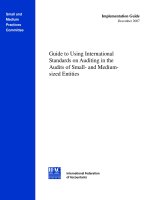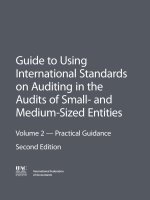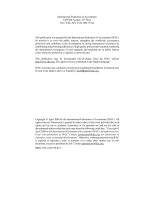Audit book by m asif chapter 19 international standards on review engagements
Bạn đang xem bản rút gọn của tài liệu. Xem và tải ngay bản đầy đủ của tài liệu tại đây (128.34 KB, 4 trang )
Auditing – Study Notes
Chapter 19 International Standards on Review Engagements
CHAPTER NINTEEN
INTERNATIONAL STANDARDS ON
REVIEW ENGAGEMENTS
LO #
LEARNING OBJCTIVE
PART A – INTRODUCTION TO AUDIT AND RELATED SERV ICES
REFERENCE
LO 1
AUDIT AND AUDIT RELATED SERV ICES
16.1.1
16.1.4
LO 2
TYPES OF REV IEW ENGAGEMENT
16.1.2
LO 3
DUE DILIGENCE ENGAGEMENTS
16.1.3
PART B – ENGAGEMENT TO REV IEW FINANCIAL INFORMATION
LO 4
PRINCIPLES TO APPLY TO REV IEW ENGAGEMENTS
LO 5
PROCEDURES FOR A REV IEW ENGAGEMENT
LO 6
REPORT OF A REV IEW ENGAGEMENT
1
16.1.4
16.1.6
16.1.4
16.1.7
16.1.5
16.1.8
Auditing – Study Notes
Chapter 19 International Standards on Review Engagements
PART A – INTRODUCTION TO AUDIT AND RELATED SERVICES
LO 1: AUDIT AND AUDIT RELATED SERV ICES:
Audit:
Audit is a form of assurance engagement. Objective of an audit is to obtain reasonable assurance
whether financial statements have been prepared, in all material respects, in accordance with
applicable financial reporting framework.
Review:
Review is also a form of assurance engagement. Objective of a review is to obtain moderate
assurance whether anything has come to auditor’s attention that causes him to believe that interim
financial information is not prepared, in all material respects, in accordance with applicable
financial reporting framework.
Agreed-upon Procedures:
The objective is to carry out procedures of audit nature to which the auditor and the entity have
agreed and to report on factual findings.
Compilations:
The objective is to carry out procedures of accounting nature to collect, classify and summarize
financial information e.g. preparing a tax computation for client.
LO 2: TYPES OF REV IEW ENGAGEMENT :
There are two types of review engagements:
Attestation Engagement:
In this type of engagement, a practitioner is engaged to attest to something e.g. to attest that certain
procedures within the entity have been performed in prescribed way. Practitioner will not
comment on quality of procedures.)
Direct reporting engagement:
In this type of engagement, a practitioner is engaged to provide a special report on some aspect of
client’s affairs. Practitioner performs examination of financial information and expresses negative
form of conclusion (moderate assurance). A common example is “Due Diligence Engagement”.
LO 3: DUE DILIGENCE ENGAGEMENTS:
Due Diligence Engagement:
This is a type of direct reporting review engagement and is usually performed in the context of
Mergers and Takeovers. Objective is to obtain information about the Target company prior to take
over to find out everything that may be relevant about target company’s financial performance,
financial position and future prospects.
Main objective of a Due Diligence is:
To decide whether a takeover or merger is actually desirable.
If so, what should be proposed cost of acquisition.
2
Auditing – Study Notes
Chapter 19 International Standards on Review Engagements
Items to investigate in a Due Diligence Exercise:
1. Financial Performance and Financial Position (e.g. looking at financial statements of
company, budgets etc., performing ratio analysis and evaluating trends)
2. Operational Issues (e.g. major contracts with customers, high rate of labor turnover, high
cost of warranties to customers)
3. Management Representations (evaluating management’s representation regarding takeover
e.g. if management says that there is no tax investigation or significant litigations)
4. Identification of assets (specially intangible assets are identified for inclusion in financial
statements of acquirer e.g. internally generated goodwill, patent rights, customer lists,
brand names)
5. Future Benefits and costs of takeover (it includes analysis of future benefits e.g. synergy
effect from economies of scale)
Benefits of using an audit firm for due diligence:
An audit firm has expertise.
Saves time for management.
Re-assures that acquisition has been properly and professionally evaluated.
PART B – ENGAGEMENT TO REVIEW FINANCIAL INFORMATION
LO 4: PRINCIPLES TO APPLY TO REV IEW ENGAGEMENTS :
A professional engaged in a review engagement shall:
Comply with ethical requirements.
Agree terms of engagement
Plan and perform the work with professional skepticism
Obtain sufficient and appropriate evidence by performing “Review Procedures”.
Express his conclusion in negative form in a written report.
LO 5: PROCEDURES FOR A REV IEW ENGAGEMENT :
The auditor should make inquiries, primarily of persons responsible for financial and accounting
matters, and perform analytical and other review procedures to enable the auditor to conclude on
financial statements. A review ordinarily does not require tests of the accounting records through
inspection, observation or confirmation.
Practitioner shall:
1. Obtain understanding of entity and its industry.
2. Make inquiries of management about significant matters e.g. about identification of
subsequent events affecting financial information, about events or conditions affecting
ability of entity to continue as a Going concern.
3. Applying analytical procedures i.e.
a. Comparing financial information with Prior Period, Budgets competitors and
industry
b. Study of Relationships between elements in financial statements that should be
expected to confirm a predictable pattern.
4. Reading the minutes of the meetings of shareholders, and TCWG.
5. Other review procedures including:
a. evaluating uncorrected misstatements (as in audit).
3
Auditing – Study Notes
Chapter 19 International Standards on Review Engagements
b. obtain written representation letter from management.
c. consider matters giving rise to modification in audit/review report in previous
periods.
d. read other information to identify a material inconsistency.
LO 6: REPORT OF A REV IEW ENGAGEMENT :
Examples of Review Reports on Interim Financial Information (Unqualified Conclusion)
AUDITORS’ REPORT TO THE MEMBERS ON REVIEW OF CONDENSED INTERIM FINANCIAL INFORM ATION
Introduction
We have reviewed the accompanying condensed interim statement of financial position of Pakistan Telecommunication
Company Limited as at June 30, 2014, and the related condensed interim statement of comprehensive income, condensed
interim statement of cash flows, condensed interim statement of changes in equity and notes to the financial information
for the six months period then ended (here-in-after referred to as the “interim financial information”). Management is
responsible for the preparation and presentation of this interim financial information in accordance with approved
accounting standards as applicable in Pakistan for interim financial reporting. Our responsibility is to express a conclusion
on this interim financial information based on our review.
Scope of Review
We conducted our review in accordance with International Standard on Review Engagements 2410, “Review of Interim
Financial Information Performed by the Independent Auditor of the Entity”. A review of interim financial information
consists of making inquiries, primarily of persons responsible for financial and accounting matters, and applying analytical
and other review procedures. A review is substantially less in scope than an audit conducted in accordance with
International Standards on Auditing and consequently does not enable us to obtain assurance that we would become
aware of all significant matters that might be identified in an audit. Accordingly, we do not express an audit opinion.
Conclusion
Based on our review, nothing has come to our attention that causes us to believe that the accompanying interim financial
information as of and for the six months period ended June 30, 2014, is not prepared, in all material respects in accordance
with approved accounting standards as applicable in Pakistan for interim financial reporting.
Auditor
Auditor
Date
Address
4









